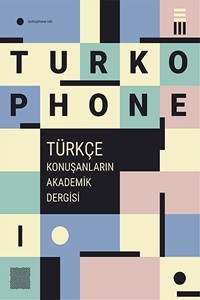Why to Involve Teachers in the Process of Language Curriculum Development?
Müfredat geliştirme, müfredat geliştirme sürecinde öğretmenin rolleri, müfredat geliştirmede paydaşlar, karar verme mekanizmaları, kurumsal yapı, yabancı dil öğretiminde işbirliği
Why to Involve Teachers in the Process of Language Curriculum Development?
Curriculum development, teachers’ roles in curriculum development process, stakeholders in curriculum development, decision-making mechanisms, organizational structure, collaboration in language teaching.,
___
- Beane, J.A. & Apple, M.W. (2007). The case for democratic schools. In M.W. Apple & J.A. Beane (Eds.), Democratic schools: Lessons in powerful education (pp.1-29). Portsmouth, NH: Heinemann.
- Candlin, C. & Rodgers, T. (1985). Talking Shop: Curriculum and Syllabus Design. ELT Journal, 39/2, pp.101
- Davis, J. & Osborn, T.A. (2003). The Language Teacher‟s Portfolio: A Guide for Professional Development London: Praeger.
- Earle Chaffee, E. & Sherr, L.A. (1992). Quality: Transforming Postsecondary Education.
- Washington DC: The George Washington University.
- European Association for Quality Assurance in Higher Education (2009). Standards and Guidelines for Quality Assurance in the European Higher Education Area. Helsinki
- Education and Culture DG. Retrieved from http://www.enqa.eu/files/ESG_v03.pdf (June 14, 2011).
- Fenton-Smith, B. & Stillwell, C. (2011). Reading Discussion Groups for Teachers: Connecting Theory to Practice ELT Journal, 65/3, pp.251-259. doi:10.1093/elt/ccq058
- Graff, N. (2011). An Effective and Agonizing Way to Learn: Backwards Design and New Teachers‟ Preparation for Planning Curriculum Teacher Education Quarterly, Summer, pp.151-168. Retrieved from http://ehis.ebscohost.com/eds/pdfviewer/pdfviewer?vid=11&hid=1&sid=a70eed8b-2f50-456e-8aa3- ab73295c7d1b%40sessionmgr15 (April 11, 2012).
- Graves, K. (2008). The Language Curriculum: A Social Contextual Perspective. Language Teaching, 41/2, pp. 181.
- Hadley, G.S. (1999). Innovative Curricula in Tertiary ELT: A Japanese Case Study. ELT Journal, 53/2, pp.92
- Kosunen, T. & Huusko, J. (2002). Shared and subjective in curriculum making: Lessons from Finnish teachers.
- In C. Sugrue & C. Day (Eds.), Developing teachers and teaching practice (pp.234-244). London and New York: RoutledgeFalmer.
- Leuven Communiqué (Leuven and Louvain-la-Neuve), Communiqué of the Conference of European Ministers Responsible for Higher Education (28-29 April 2009). The Bologna Process 2020 - The European Higher Education Area in the New Decade. Retrieved from http://www.ehea.info/Uploads/Declarations/Leuven_Louvain-la-Neuve_Communiqu%C3%A9_April_2009.pdf (December 1, 2010).
- Nunan, D. (1988). The Learner-Centred Curriculum. New York: Cambridge University Press.
- Ricento, K. T. & Hornberger, N.H. (1996). Unpeeling the Onion: Language Planning and Policy and the ELT Professional. TESOL Quarterly, 30/3, pp. 401-427.
- Richards, J. C. (2001). Curriculum Development in Language Teaching. Cambridge: Cambridge University Press.
- Richwine, J. & Biggs, A.G. (2012). Critical Issues in Assessing Teacher Compensation. Backgrounder, No.: Retrieved from http://www.eric.ed.gov/PDFS/ED528492.pdf (April 11, 2012).
- Rowan, B. (1998). The task characteristics of teaching: Implications for the organizational design of schools. In R. Bernhardt et al. (Eds.) Curriculum leadership: Rethinking schools for the 21st century (pp.37-54), New Jersey: Hampton Press.
- Segovia, L.P. & Hardison, D.M. (2009) Implementing Education Reform: EFL Teachers‟ Perspectives ELT Journal, 63/2, pp. 154-162. doi:10.1093/elt/ccno24
- Storey, C.W. (2007). Insights into Language Curriculum Development Electronic Journal of Foreign Language Teaching, 4/1, pp.86–107. Retrieved from http://e-flt.nus.edu.sg/v4n12007/storey.htm (June 29, 2008).
- Thomas, P.L. (2003). A Call to Action The English Journal, 93/ 2, pp. 67-69. Retrieved From http://links.jstor.org/sici?sici=00138274%28200311%2993%3A2%3C67%3AACTA% E2.0.CO%3B2-6 (February 13, 2008).
- Tosi, H.L. & Hamner, W.C. (Eds.). (1985). Organizational Behavior and Management Ohio: Grid Publishing Company.
- Vo, L.T. & Nguyen, T.M. (2010). Critical Friends Group for EFL Teacher Professional Development. ELT Journal, 64/2, pp. 205-213. doi:10.1093/elt/ccpo25
- Wette, R. (2011). Product-process Distinctions in ELT Curriculum Theory and Practice ELT Journal, 65/2, pp. 144. Retrieved from http://eltj.oxfordjournals.org/ doi:10.1093/elt/ccq022 (March 4, 2013).
- Wiles, J. & Bondi, J. (2007). Curriculum Development: A Guide to Practice. N.J.: Pearson Merrill Prentice Hall.
- ISSN: 2148-6808
- Başlangıç: 2014
- Yayıncı: Bekir İNCE
Extra G. ve Yağmur K. (2013) Dil Zengini Avrupa, Cambridge Üniversitesi Yayınevi
TÜRKÇE ÖĞRENEN YABANCI UYRUKLU ÖĞRENCİLERİN DERS ÇALIŞMA ÖZYETERLİK ALGISI VE UYGULAMA ÖRNEĞİ
Öğrenir Derlemleri: Kapsam, Tasarım ve Uygulamalar
Bilgisayar Oyun Dergileri ve Yabancı Dil Olarak Türkçenin Öğretimi
8-10. SINIF “TÜRKÇE VE TÜRK KÜLTÜRÜ”DERS KİTABININ HEDEF YAŞ DÜZEYİNE UYGUNLUĞU
Yabancı Dil Olarak Türkçe Öğretimi
Çift Dilli Çocukların Dil Gelişimi
Why to Involve Teachers in the Process of Language Curriculum Development?
